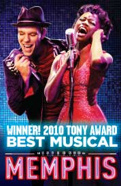Memphis Star Cass Morgan on How a Yankee Became the Ultimate Southern Mother
About the author:
Broadway audiences first fell in love with Cass Morgan almost 30 years ago when she and Debra Monk played sassy sister waitresses in the charming Tony-nominated musical Pump Boys and Dinettes. Since then, Morgan has repeatedly been cast as strong southern women, even though she hails from upstate New York. Currently playing feisty mom Gladys Calhoun in the hit musical Memphis, she takes what at first seems to be an unsympathetic role and infuses it with humor and humanity. We asked this talented actress to trace her road to Memphis—and recall some of her favorite stage ladies from south of the Mason-Dixon line.
![]()
I got my Equity card 40-some years ago as a company member at the old Front Street Theatre in Memphis, Tennessee. And now, all these decades later, here I am playing Mama Calhoun on Broadway in none other than Memphis, the musical. That has got to be some kind of synchronicity, don’t you think?
Gladys (Mama’s Christian name) is the latest notch in my belt of southern characters I’ve had the honor to create on stage. How, you might ask, has a Yankee from Rochester, New York, wound up with this kind of good luck? Well, let’s see......
I spent a crucial six months at the age of three in a trailer park in North Carolina (don’t ask). That’s got to be the beginning of the tuning of my ear to the delicious music in the southern voice—the rhythms, the inflections, the colorful turns of phrase. It just seemed to fit me. I ran around with a pack of shoeless kids, saying “y’all”, singing the Patti Page and Teresa Brewer songs I heard on the radio and becoming a southerner.
Let’s skip ahead a few decades to the mid-’70s, to when I met my (now ex) husband Jim Wann. The music he made was a kind of southern Americana, and I felt right at home singing it. In the early ’80s, Deb Monk and I joined forces with Jim and a few other good friends, to create Pump Boys and Dinettes. Deb and I were Prudie and Rhetta Cupp; sisters “with a menu to fill a man up.” We used to sit in my kitchen, laughing at the family history we were inventing for ourselves, as we baked the pies we later used in the show and then served to the audience at the tiny Colonnades Theatre. What a hoot! From where I sit now, those were the good old days.
But hey... life is long, and there have been lots of good old days.
In the late ’80s Connie Ray wrote a two-character, one-act play for MCC called Catfish Loves Anna, and she cast me as her sister. We had a ball, and have stayed friends all these years, and now she is starring on Broadway in Next Fall, right across 44th Street from Memphis. Now is that synchronous or what??
The ’90s brought me Floyd Collins and Violet (I did lots of other shows, too, but we’re sticking to the southern women), and they remain two of my favorite gigs. The deeply superstitious Miss Jane in Floyd Collins had dirt under her fingernails and mud on her shoes. Actually the costume designer wanted us all to have mud on our shoes, so one night after a dress/tech rehearsal, old brown scene paint was slopped on every pair. (When I say old, I mean old: That paint had been sitting around Playwrights Horizons for years, and had gone sour. Our shoes stunk so bad, we might as well have stood in cow flop.) In Violet, I played several women, from a little old lady to a street walker in—yes!—Memphis.
In 2004, The Immigrant, a beautiful chamber musical adapted by Steve Alper and Sarah Knapp from Mark Harelik’s play of the same name, gave me another classic southern role. Ima Perry could be Gladys Calhoun’s turn-of-the-last-century relative. She’s a hard core Baptist, rigid in her ways, but with just enough tenderness to learn to accept and eventually love a young Russian immigrant, the “only Jew in Hamilton, Texas.” It’s a beautiful story of acceptance and forgiveness, and it should have played here much longer than it did.
And now we’re up to Memphis. I have got to have one of the coolest jobs on Broadway. Not only is this show full of joy and hope, but I get to start out as a fearful, exhausted, overworked single mom who doesn’t like or understand the path her son has chosen for himself. Yet by the time I sing the kick-ass song “Change Don’t Come Easy” late in the second act, I’ve had my hair done, gotten a fabulous new wardrobe, a new house and an entirely new outlook on life.
Maybe the best thing about playing Mama is the great pleasure of being Chad Kimball’s mom eight times a week. He is a singular talent, and he has created a wonderfully detailed and multi-layered character in Huey Calhoun. You can just see the handful he must have been as a child. (It’s a wonder Gladys didn’t “snatch him bald-headed.”) In the end, my character not only embraces her son’s achievements, she even encourages him to go beyond what he thought he was capable of. What a ride!
